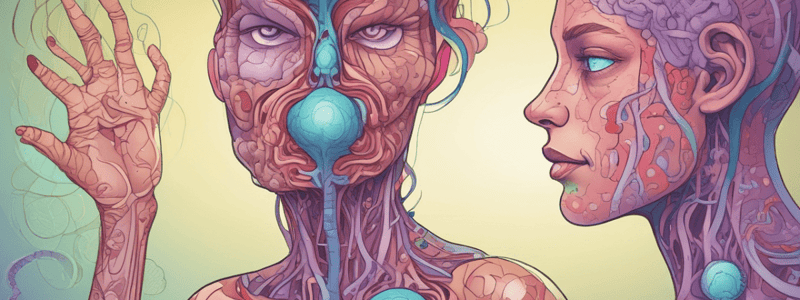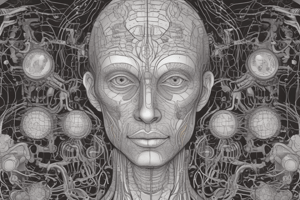Podcast
Questions and Answers
What is the primary function of hormones in the body?
What is the primary function of hormones in the body?
- To produce energy for the body
- To regulate various physiological processes (correct)
- To fight off infections
- To destroy harmful substances in the body
Which type of hormone is derived from amino acids?
Which type of hormone is derived from amino acids?
- Fatty acid hormones
- Peptide hormones
- Amine hormones (correct)
- Steroid hormones
What is the result of hyposecretion of hormones?
What is the result of hyposecretion of hormones?
- Excessive hormone production
- Hormone imbalance
- Hormone resistance
- Insufficient hormone production (correct)
Flashcards
What are Hormones?
What are Hormones?
Hormones are chemical messengers produced by glands in the body that regulate various physiological processes. They are secreted into the bloodstream and transported to target cells, tissues, or organs to exert their effects.
How are Hormones Regulated?
How are Hormones Regulated?
Hormones can regulate their own production through a system called feedback. Negative feedback involves a hormone inhibiting its own production or stimulating the production of inhibitory hormones. Positive feedback, on the other hand, involves a hormone stimulating its own production, leading to an increase in hormone levels.
What are the consequences of hormone imbalance?
What are the consequences of hormone imbalance?
Insufficient hormone production is called hyposecretion, which can lead to deficiencies or disorders. Excessive hormone production is called hypersecretion, which can also lead to disorders or diseases.
Study Notes
What are Hormones?
- Hormones are chemical messengers produced by glands in the body that regulate various physiological processes.
- They are secreted into the bloodstream and transported to specific cells, tissues, or organs to exert their effects.
Types of Hormones
- Steroid hormones: derived from cholesterol, examples include:
- Sex hormones (estrogen, testosterone)
- Adrenal cortex hormones (aldosterone, cortisol)
- Peptide hormones: composed of amino acids, examples include:
- Insulin
- Growth hormone
- Thyroid-stimulating hormone (TSH)
- Amine hormones: derived from amino acids, examples include:
- Epinephrine (adrenaline)
- Norepinephrine
- Thyroxine (T4)
Hormone Regulation
- Negative feedback: hormones regulate their own production by inhibiting the production of other hormones or stimulating the production of inhibitory hormones.
- Positive feedback: hormones stimulate their own production, leading to an increase in hormone levels.
Hormone Functions
- Growth and development: hormones regulate growth, development, and maturation of tissues and organs.
- Metabolism: hormones regulate metabolic processes, such as glucose and energy metabolism.
- Electrolyte and water balance: hormones regulate electrolyte and water balance, affecting blood pressure and fluid balance.
- Reproduction: hormones regulate reproductive processes, including puberty, menstruation, and fertility.
Hormone Imbalance
- Hyposecretion: insufficient hormone production, leading to deficiencies or disorders.
- Hypersecretion: excessive hormone production, leading to disorders or diseases.
Examples of Hormone-Related Disorders
- Diabetes: insulin deficiency or resistance
- Thyroid disorders: hypothyroidism (underactive thyroid) or hyperthyroidism (overactive thyroid)
- Growth hormone deficiency: dwarfism or growth retardation
- Hypogonadism: deficiency in sex hormones, leading to reproductive disorders
Hormones
- Hormones are chemical messengers produced by glands in the body that regulate various physiological processes.
- They are secreted into the bloodstream and transported to specific cells, tissues, or organs to exert their effects.
Types of Hormones
- Steroid hormones: derived from cholesterol, regulate sex characteristics and electrolyte balance.
- Examples: estrogen, testosterone, aldosterone, cortisol
- Peptide hormones: composed of amino acids, regulate growth, metabolism, and other functions.
- Examples: insulin, growth hormone, thyroid-stimulating hormone (TSH)
- Amine hormones: derived from amino acids, regulate heart rate, blood pressure, and metabolic rate.
- Examples: epinephrine (adrenaline), norepinephrine, thyroxine (T4)
Hormone Regulation
- Negative feedback: hormones regulate their own production by inhibiting the production of other hormones or stimulating the production of inhibitory hormones.
- Positive feedback: hormones stimulate their own production, leading to an increase in hormone levels.
Hormone Functions
- Growth and development: hormones regulate growth, development, and maturation of tissues and organs.
- Metabolism: hormones regulate metabolic processes, such as glucose and energy metabolism.
- Electrolyte and water balance: hormones regulate electrolyte and water balance, affecting blood pressure and fluid balance.
- Reproduction: hormones regulate reproductive processes, including puberty, menstruation, and fertility.
Hormone Imbalance
- Hyposecretion: insufficient hormone production, leading to deficiencies or disorders.
- Hypersecretion: excessive hormone production, leading to disorders or diseases.
Examples of Hormone-Related Disorders
- Diabetes: insulin deficiency or resistance
- Thyroid disorders: hypothyroidism (underactive thyroid) or hyperthyroidism (overactive thyroid)
- Growth hormone deficiency: dwarfism or growth retardation
- Hypogonadism: deficiency in sex hormones, leading to reproductive disorders
Studying That Suits You
Use AI to generate personalized quizzes and flashcards to suit your learning preferences.




